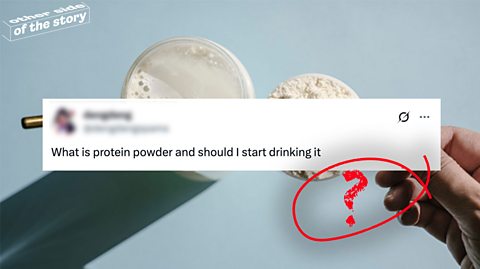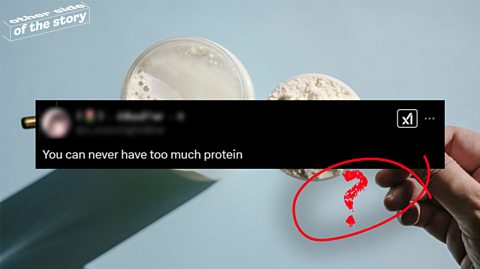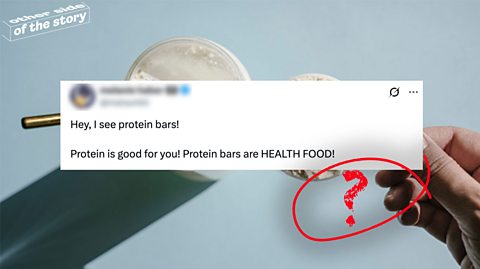There are thousands of posts about protein powders on TikTok, with influencers posting reviews and a whole heap of claims on everything from how much protein we should eat, to the health benefits of protein bars. But what’s the truth behind some of these claims?
Check out this clip from an episode of Sliced Bread, a BBC Sounds podcast.
Greg: Well, let's start with the obvious question what is protein and what do we use it for?
Graeme: Protein is one of the three macronutrients that we get from food. We're going to get our carbohydrates, which are generally the potatoes, rices, pastas… we're going to get our fats… and then the third macronutrient is from protein.
Greg: And what do we use protein for?
Graeme: Pretty much everything! We think about protein and the really key role that it has in muscle growth and repair. But then we forget the other really important roles of protein. So for example, our immune system is highly dependent on the protein foods that we eat.
What is protein?
Protein, alongside fat and carbohydrate, is one of the three Macronutrients are nutrients that are needed in large amounts by the body – protein, fat and carbohydrate. that we get from food. Protein is made up of
The body needs protein for a number of reasons: for growth, in particular during pregnancy and adolescence, to repair body cells and tissues, including recovery after illness or injury, to produce enzymes needed for digestion and to produce hormones that control body functions. Protein-rich foods include meat, fish, eggs, milk, cheese, beans, peas and tofu.
What are protein powders?

Protein powders are a dietary supplement in powder form that can be mixed with milk, water, yoghurt, porridge and other foods to help you meet your protein needs. It is mainly used as a supplement for those working out and going to the gym to help with muscle growth, weight loss and energy levels.
Whey protein is derived from milk and is a by-product of the cheesemaking process. It can be processed into many types of powders.
Plant-based protein powders are made from products such as soy, pea and hemp.
Why are protein shakes so popular?
A recent YouGov survey of over 2,000 adults in the UK revealed that 27% of 18-24-year-olds regularly drink protein shakes, with health and wellness and energy boosts cited as the main reasons for their popularity.
Protein shakes are drinks made by mixing protein powder with milk or water. They can be mixed at home or bought pre-prepared.
Online trends can easily influence our tastes and behaviours and there could be many reasons why wellness seems to be on the rise. There’s a much bigger interest in healthy lifestyles than before, and if you engage with a piece of content by watching, liking, or sharing, it’ll be picked up by the algorithms and you’ll be fed more similar content.
As a result, you may see a lot more promotion on your FYP, especially from celebrities and influencers. But, with anything health related, it’s always essential you check medical and expert advice before purchasing and consuming.
How much protein do I need?

Graeme Close, Professor of Human Physiology, Sport and Exercise Sciences at Liverpool John Moores University, told the Sliced Bread podcast that adults are advised to eat about 0.8 grams of protein per kilo of body weight daily. For the average woman, this is 45g of protein, or 55g for men – that’s about two portions of meat, fish, nuts or tofu. Graeme says that as we get older the amount of protein we need can be as much as double that of a younger person.
Graeme adds that there is no real evidence that higher than 2 grams of protein per kilo of body weight is effective. But he does say that we’ve made getting exactly enough protein really complicated, and that eating a reasonable amount of protein in our meals spread throughout the day is fine.
Is protein powder good for you?
Whilst protein powders are a convenient way for you to meet your daily protein intake, it is recommended that you should always aim for a food first approach. If you have a healthy and balanced diet then it is possible to get the recommended daily protein intake from food alone.
Are protein bars good for you?

According to Professor Graeme Close, protein bars are generally sweet bars with a bit of protein in them. He says just because they have protein in them, it doesn’t necessarily make them healthy, and they can still be processed.
Speaking to the Sliced Bread podcast about protein bars, Professor Close said: "What people want is a sweet treat, and have been conned into thinking that this (a protein bar) is a healthy sweet treat and it really isn't."
Some homemade protein bars, made from natural ingredients may be a healthier alternative.
With anything health related, it’s always essential you check medical and expert advice before purchasing and consuming as there can be a lot of misinformation about health trends posted on on social media.
You can get more from Sliced Bread, Bitesize and BBC News on BBC Sounds.

Not sure if the news you’re seeing on social media is true or false? Can you always tell if the things you see online are real or fake? Learn how to get the other side of the story with our quizzes, videos and explainers.


